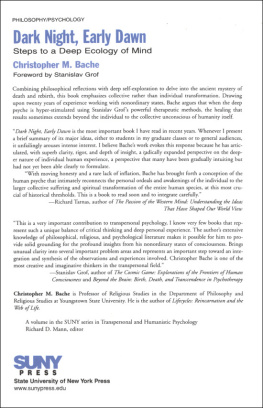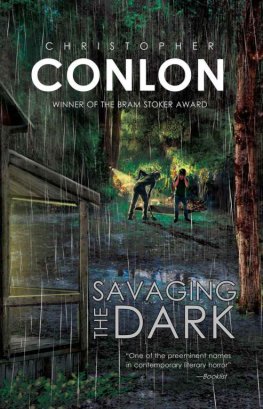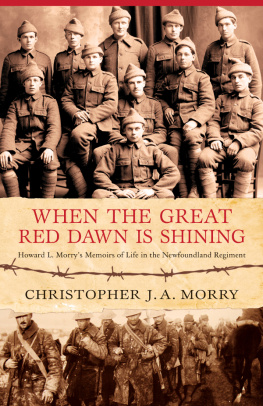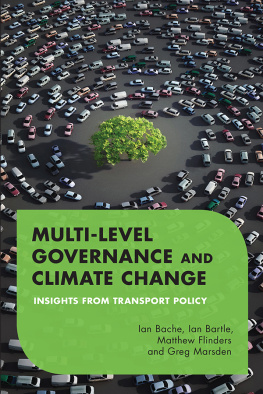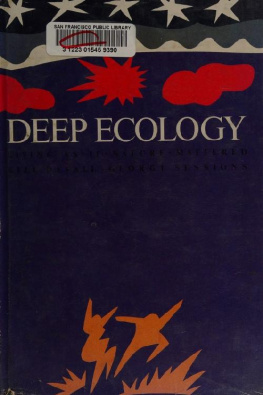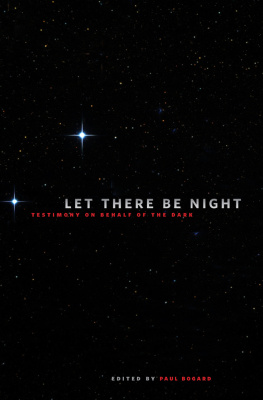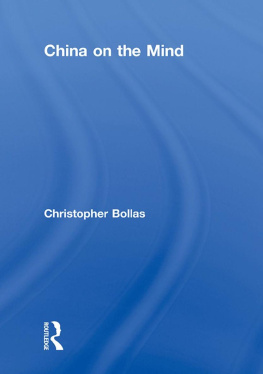Bache Christopher M. - Dark Night, Early Dawn : Steps to a Deep Ecology of Mind
Here you can read online Bache Christopher M. - Dark Night, Early Dawn : Steps to a Deep Ecology of Mind full text of the book (entire story) in english for free. Download pdf and epub, get meaning, cover and reviews about this ebook. year: 2000, publisher: LightningSource, genre: Religion. Description of the work, (preface) as well as reviews are available. Best literature library LitArk.com created for fans of good reading and offers a wide selection of genres:
Romance novel
Science fiction
Adventure
Detective
Science
History
Home and family
Prose
Art
Politics
Computer
Non-fiction
Religion
Business
Children
Humor
Choose a favorite category and find really read worthwhile books. Enjoy immersion in the world of imagination, feel the emotions of the characters or learn something new for yourself, make an fascinating discovery.
- Book:Dark Night, Early Dawn : Steps to a Deep Ecology of Mind
- Author:
- Publisher:LightningSource
- Genre:
- Year:2000
- Rating:4 / 5
- Favourites:Add to favourites
- Your mark:
- 80
- 1
- 2
- 3
- 4
- 5
Dark Night, Early Dawn : Steps to a Deep Ecology of Mind: summary, description and annotation
We offer to read an annotation, description, summary or preface (depends on what the author of the book "Dark Night, Early Dawn : Steps to a Deep Ecology of Mind" wrote himself). If you haven't found the necessary information about the book — write in the comments, we will try to find it.
Dark Night, Early Dawn : Steps to a Deep Ecology of Mind — read online for free the complete book (whole text) full work
Below is the text of the book, divided by pages. System saving the place of the last page read, allows you to conveniently read the book "Dark Night, Early Dawn : Steps to a Deep Ecology of Mind" online for free, without having to search again every time where you left off. Put a bookmark, and you can go to the page where you finished reading at any time.
Font size:
Interval:
Bookmark:
Dark Night, Early Dawn
Suny series in Transpersonal and Humanistic Psychology
Richard D. Mann, editor
Steps to a Deep Ecology of Mind
Christopher M. Bache
Foreword by
Stanislav Grof

Published by
State University of New York Press, Albany
2000 State University of New York
All rights reserved
Printed in the United States of America
No part of this book may be used or reproduced in any manner whatsoever without written permission. No part of this book may be stored in a retrieval system or transmitted in any form or by any means including electronic, electrostatic, magnetic tape, mechanical, photocopying, recording, or otherwise without the prior permission in writing of the publisher.
For information, contact State University of New York Press, Albany, NY www.sunypress.edu
Cover Image : The Earth and Moon courtesy of the Galileo Project and NASA
Production by Kristin Milavec
Marketing by Fran Keneston
Library of Congress Cataloging-in-Publication Data
Bache, Christopher Martin.
Dark night, early dawn : steps to a deep ecology of mind/
Christopher M. Bache; forword by Stanislav Grof.
p. cm.(SUNY series in transpersonal and humanistic psychology)
Includes bibliographical references and index.
ISBN 0-7914-4605-0 (hardcover : alk. paper)ISBN 0-7914-4606-9
(pbk. : alk. paper)
1. Transpersonal psychology. 2. PsychologyPhilosophy.
3. Altered states of consciousness. 4. Reincarnation. I. Title. I. Series
BF204.7 B33 2000
150.198dc21 99-049013
10 9 8 7 6 5 4 3 2 1
To Carol
A new order on earth will not begin, I believe, until we all learn to see the pollution in our own hearts. And that will not happen until many of us, a critical mass, experience with remorse a real change of consciousness.
James George, Asking for the Earth
The second half of the twentieth century has seen an extraordinary renaissance of interest in the exploration of human consciousness. Its most dramatic and widely publicized expressions were clinical research with psychedelics, conducted during the 1950s and 1960s in many countries of the world, and unsupervised self-experimentation with these remarkable agents. After drastic administrative and legal restrictions terminated scientific experimentation with psychedelics, deep self-exploration has continued in the form of powerful new forms of nondrug experiential psychotherapy, such as various neo-Reichian approaches, hypnosis, primal therapy, rebirthing, and Holotropic Breathwork.
Laboratory research contributed the methods of sensory deprivation, biofeedback, lucid dreaming, and the use of various electronic entrainment devices. The work with patients dying of terminal diseases and the study of the states of consciousness emerging in near-death situations gave birth to a new scientific disciplinethanatology. Careful systematic investigation of spontaneous past-life experiences in children and of past-life experiences induced in adults by a variety of methods made it possible to subject to scientific scrutiny the concept of reincarnation and karma. The zeitgeist of this era also brought great enthusiasm for the study of shamanism, the ritual life of aboriginal cultures, the spiritual philosophies of the East, and the mysticism of all countries and ages.
The empirical interest in consciousness and spirituality characterizing this exciting period has been accompanied by systematic efforts to find expanded theoretical frameworks for the wide range of revolutionary discoveries concerning the nature of the human psyche that this work had produced. These challenging observations inspired transpersonal psychology, a discipline that studies the entire range of human experience, including nonordinary states of consciousness, and that attempts to bring together the best of spirituality and the best of science.
Christopher Bachephilosopher, religious scholar, and inspired educatorhas made important contributions to this endeavor and has established himself as one of the most creative and original transpersonal thinkers. In a series of articles, presentations at international transpersonal conferences, and his earlier book Lifecycles, he has addressed some of the most important and urgent theoretical issues that have emerged in modern consciousness research. Dark Night, Early Dawn represents a culmination and synopsis of years of his explorations and is his most mature work to date.
What makes Baches contribution invaluable is a rare combination of rigorous spiritual discipline, profound personal experience with nonordinary states of consciousness, incisive analytical thinking, and impeccable scholarship. All these qualities are absolutely indispensable for the important task he has set for himselfto seek the greatest possible clarity in a highly controversial area that has the potential to change the entire philosophical paradigm of Western science. As Bache himself convincingly demonstrates in the introductory chapter of his book, what is at stake is nothing less than our understanding of consciousness, our identity, and the nature of reality itself.
It is astonishing that the academic circles in their deep commitment to materialistic philosophy and linear determinism have thus far refused to critically examine the extraordinary and startling observations amassed by several decades of consciousness research and transpersonal psychology. Had that happened, it would have led to an inevitable conclusionthe urgent need for a radical revision of our understanding of human nature and the nature of reality. Bache justly compares the academic community to a culture that in its search for truth has denied itself access to the night sky with its deep secrets and bases its worldview entirely on daytime observations.
A salient example of this deep reluctance to face observations that undermine and challenge the leading paradigm is the repeatedly confirmed fact of out-of-body experiences, during which disembodied consciousness, even that of congenitally blind persons, is capable of perceiving events in the immediate environment and in various remote locations. This observation, in and of itself, should be sufficient to raise serious doubts about our current beliefs concerning the relationship between consciousness and matter. And yet, educators in our universities continue to teach with unshaken authority that consciousness is an epiphenomenon of matter and that it somehow mysteriously emerges out of the complexity of neurophysiological processes in the central nervous system.
Christopher Bache does much more than bring a convincing argument for the critical epistemological and ontological importance of the study of nonordinary states of consciousness. Using his intimate knowledge of the deepest recesses of the human psyche, he brings extraordinary clarity into theoretically important areas in transpersonal psychology, particularly psychedelic states, near-death experiences, and out-of-body episodes.
Bache often reveals impartially both the strength and the weakness of a particular set of data or theoretical position. In the chapter discussing reincarnation, for example, he clearly indicates the impeccability of Ian Stevensons research of the past-life experiences in children and the defective reasoning of his critics. At the same time, he demonstrates that the very aspects of Stevensons material that make it compelling evidence for rebirth also create a bias that tends to prevent us from appreciating the profound implications of reincarnation for our understanding of our true identity.
Next pageFont size:
Interval:
Bookmark:
Similar books «Dark Night, Early Dawn : Steps to a Deep Ecology of Mind»
Look at similar books to Dark Night, Early Dawn : Steps to a Deep Ecology of Mind. We have selected literature similar in name and meaning in the hope of providing readers with more options to find new, interesting, not yet read works.
Discussion, reviews of the book Dark Night, Early Dawn : Steps to a Deep Ecology of Mind and just readers' own opinions. Leave your comments, write what you think about the work, its meaning or the main characters. Specify what exactly you liked and what you didn't like, and why you think so.

